人教新课标高一英语必修三教案Unit 1 Festivals around the world 全单元教案
文档属性
| 名称 | 人教新课标高一英语必修三教案Unit 1 Festivals around the world 全单元教案 |
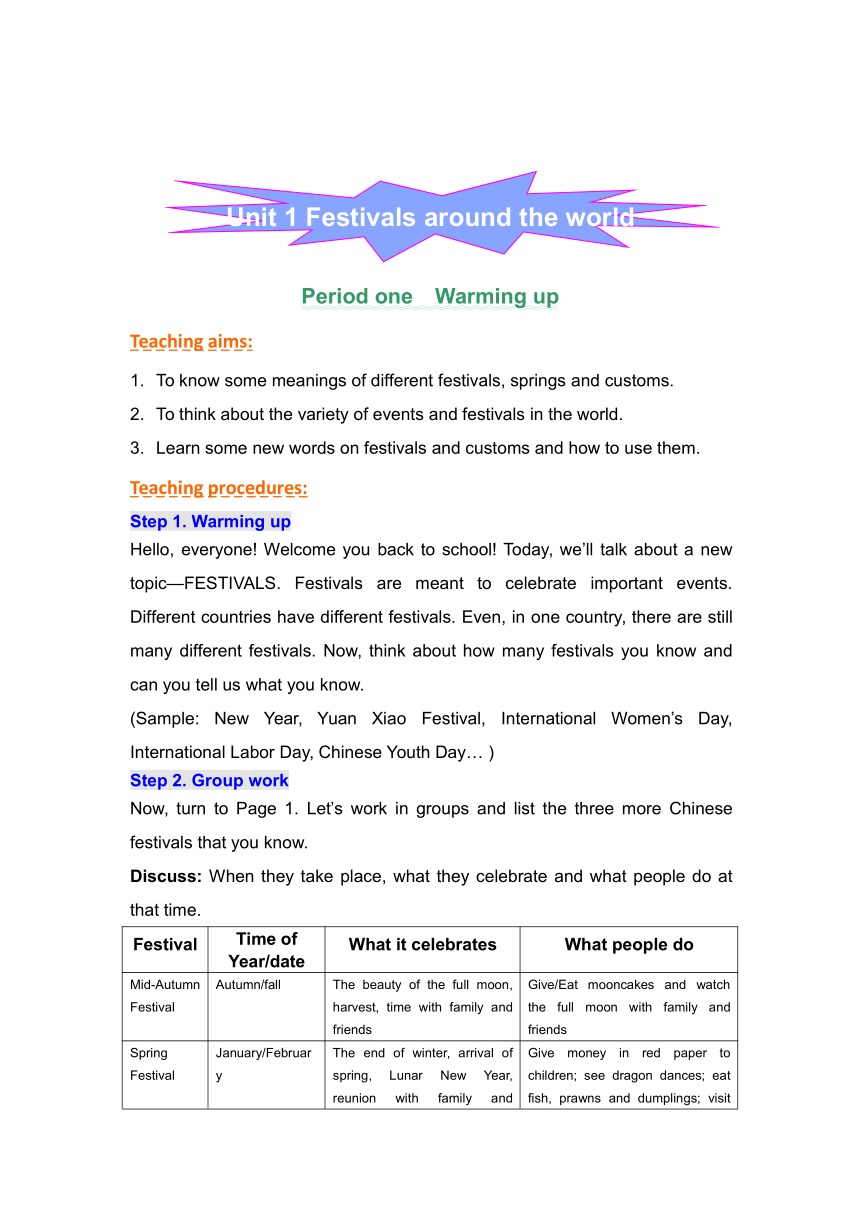
|
|
| 格式 | zip | ||
| 文件大小 | 312.4KB | ||
| 资源类型 | 教案 | ||
| 版本资源 | 人教版(新课程标准) | ||
| 科目 | 英语 | ||
| 更新时间 | 2019-10-16 11:17:40 | ||
图片预览

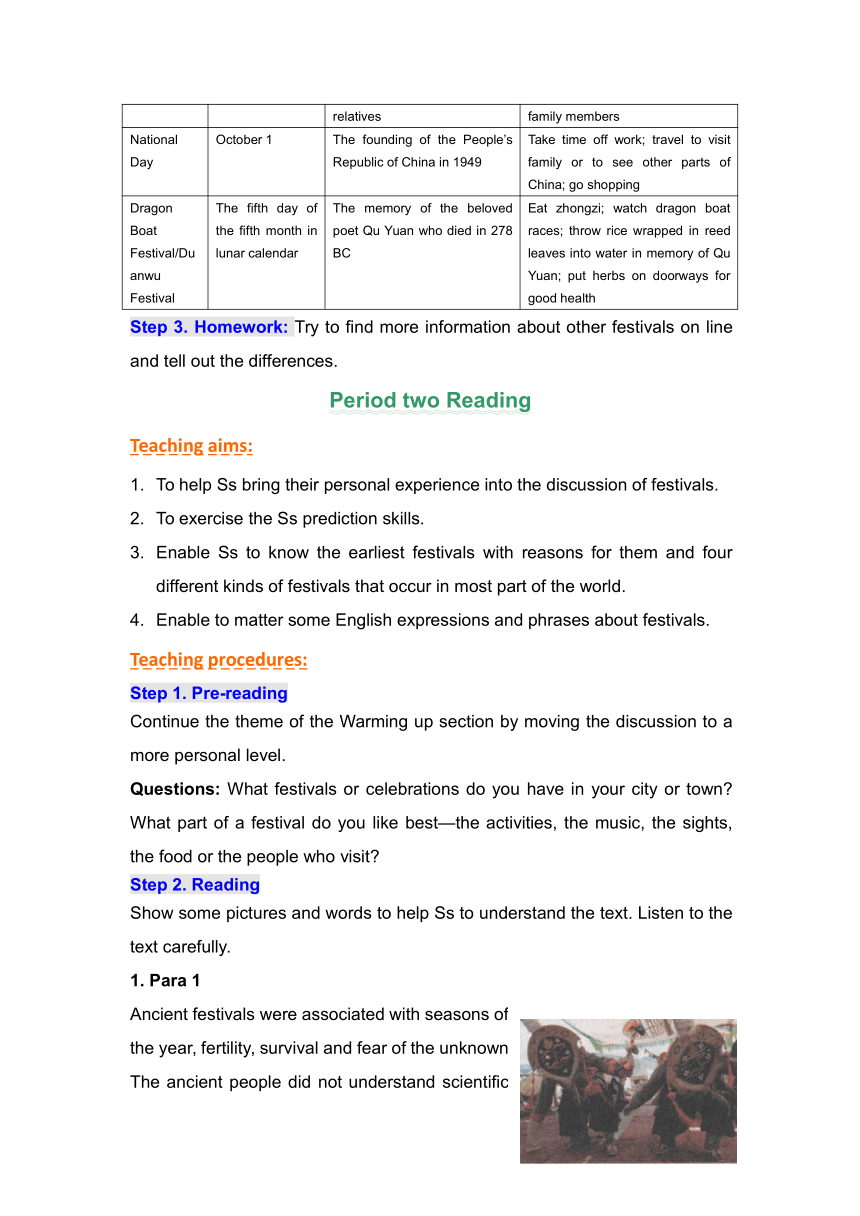
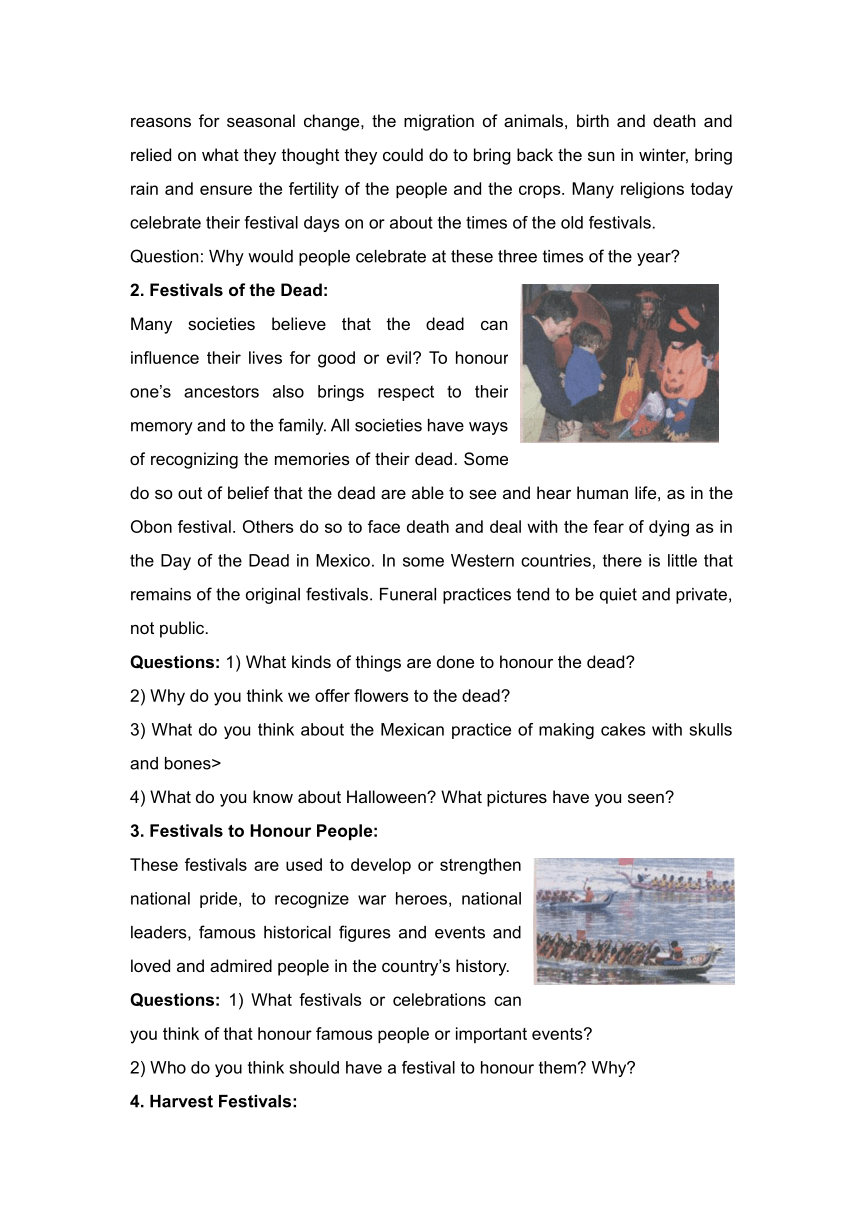
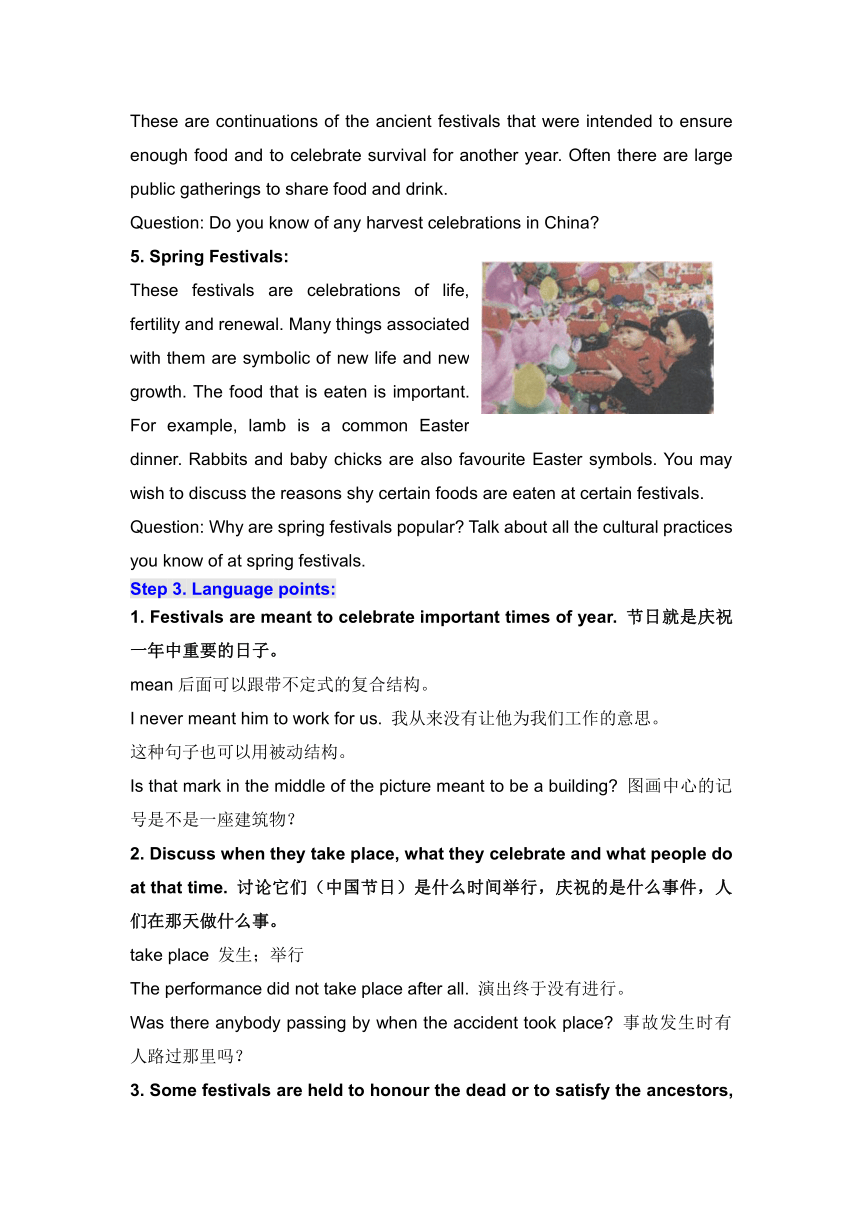
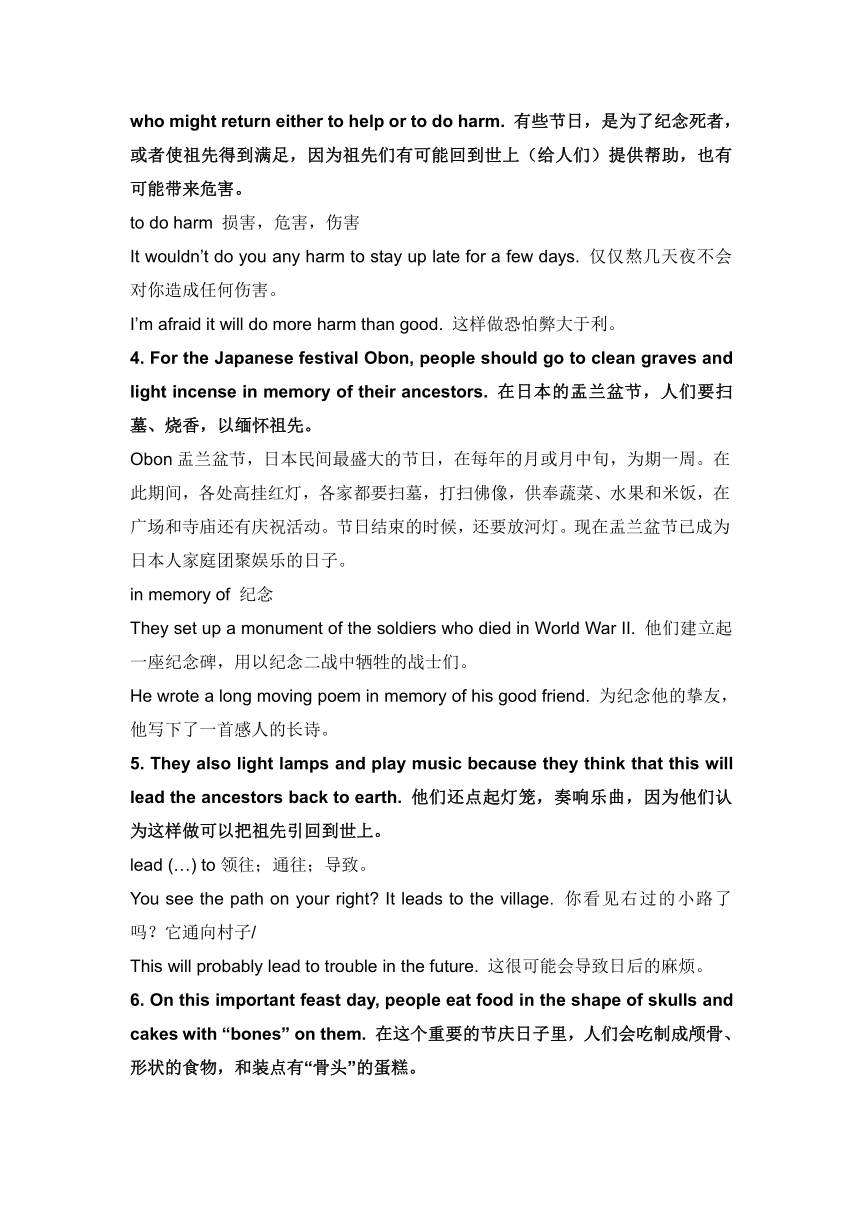
文档简介
Unit 1 Festivals around the world
Period one Warming up
Teaching aims:
To know some meanings of different festivals, springs and customs.
To think about the variety of events and festivals in the world.
Learn some new words on festivals and customs and how to use them.
Teaching procedures:
Step 1. Warming up
Hello, everyone! Welcome you back to school! Today, we’ll talk about a new topic—FESTIVALS. Festivals are meant to celebrate important events. Different countries have different festivals. Even, in one country, there are still many different festivals. Now, think about how many festivals you know and can you tell us what you know.
(Sample: New Year, Yuan Xiao Festival, International Women’s Day, International Labor Day, Chinese Youth Day… )
Step 2. Group work
Now, turn to Page 1. Let’s work in groups and list the three more Chinese festivals that you know.
Discuss: When they take place, what they celebrate and what people do at that time.
Festival
Time of Year/date
What it celebrates
What people do
Mid-Autumn Festival
Autumn/fall
The beauty of the full moon, harvest, time with family and friends
Give/Eat mooncakes and watch the full moon with family and friends
Spring Festival
January/February
The end of winter, arrival of spring, Lunar New Year, reunion with family and relatives
Give money in red paper to children; see dragon dances; eat fish, prawns and dumplings; visit family members
National Day
October 1
The founding of the People’s Republic of China in 1949
Take time off work; travel to visit family or to see other parts of China; go shopping
Dragon Boat Festival/Duanwu Festival
The fifth day of the fifth month in lunar calendar
The memory of the beloved poet Qu Yuan who died in 278 BC
Eat zhongzi; watch dragon boat races; throw rice wrapped in reed leaves into water in memory of Qu Yuan; put herbs on doorways for good health
Step 3. Homework: Try to find more information about other festivals on line and tell out the differences.
Period two Reading
Teaching aims:
To help Ss bring their personal experience into the discussion of festivals.
To exercise the Ss prediction skills.
Enable Ss to know the earliest festivals with reasons for them and four different kinds of festivals that occur in most part of the world.
Enable to matter some English expressions and phrases about festivals.
Teaching procedures:
Step 1. Pre-reading
Continue the theme of the Warming up section by moving the discussion to a more personal level.
Questions: What festivals or celebrations do you have in your city or town? What part of a festival do you like best—the activities, the music, the sights, the food or the people who visit?
Step 2. Reading
Show some pictures and words to help Ss to understand the text. Listen to the text carefully.
1. Para 1
Ancient festivals were associated with seasons of the year, fertility, survival and fear of the unknown. The ancient people did not understand scientific reasons for seasonal change, the migration of animals, birth and death and relied on what they thought they could do to bring back the sun in winter, bring rain and ensure the fertility of the people and the crops. Many religions today celebrate their festival days on or about the times of the old festivals.
Question: Why would people celebrate at these three times of the year?
2. Festivals of the Dead:
Many societies believe that the dead can influence their lives for good or evil? To honour one’s ancestors also brings respect to their memory and to the family. All societies have ways of recognizing the memories of their dead. Some do so out of belief that the dead are able to see and hear human life, as in the Obon festival. Others do so to face death and deal with the fear of dying as in the Day of the Dead in Mexico. In some Western countries, there is little that remains of the original festivals. Funeral practices tend to be quiet and private, not public.
Questions: 1) What kinds of things are done to honour the dead?
2) Why do you think we offer flowers to the dead?
3) What do you think about the Mexican practice of making cakes with skulls and bones>
4) What do you know about Halloween? What pictures have you seen?
3. Festivals to Honour People:
These festivals are used to develop or strengthen national pride, to recognize war heroes, national leaders, famous historical figures and events and loved and admired people in the country’s history.
Questions: 1) What festivals or celebrations can you think of that honour famous people or important events?
2) Who do you think should have a festival to honour them? Why?
4. Harvest Festivals:
These are continuations of the ancient festivals that were intended to ensure enough food and to celebrate survival for another year. Often there are large public gatherings to share food and drink.
Question: Do you know of any harvest celebrations in China?
5. Spring Festivals:
These festivals are celebrations of life, fertility and renewal. Many things associated with them are symbolic of new life and new growth. The food that is eaten is important. For example, lamb is a common Easter dinner. Rabbits and baby chicks are also favourite Easter symbols. You may wish to discuss the reasons shy certain foods are eaten at certain festivals.
Question: Why are spring festivals popular? Talk about all the cultural practices you know of at spring festivals.
Step 3. Language points:
1. Festivals are meant to celebrate important times of year. 节日就是庆祝一年中重要的日子。
mean后面可以跟带不定式的复合结构。
I never meant him to work for us. 我从来没有让他为我们工作的意思。
这种句子也可以用被动结构。
Is that mark in the middle of the picture meant to be a building? 图画中心的记号是不是一座建筑物?
2. Discuss when they take place, what they celebrate and what people do at that time. 讨论它们(中国节日)是什么时间举行,庆祝的是什么事件,人们在那天做什么事。
take place 发生;举行
The performance did not take place after all. 演出终于没有进行。
Was there anybody passing by when the accident took place? 事故发生时有人路过那里吗?
3. Some festivals are held to honour the dead or to satisfy the ancestors, who might return either to help or to do harm. 有些节日,是为了纪念死者,或者使祖先得到满足,因为祖先们有可能回到世上(给人们)提供帮助,也有可能带来危害。
to do harm 损害,危害,伤害
It wouldn’t do you any harm to stay up late for a few days. 仅仅熬几天夜不会对你造成任何伤害。
I’m afraid it will do more harm than good. 这样做恐怕弊大于利。
4. For the Japanese festival Obon, people should go to clean graves and light incense in memory of their ancestors. 在日本的盂兰盆节,人们要扫墓、烧香,以缅怀祖先。
Obon盂兰盆节,日本民间最盛大的节日,在每年的月或月中旬,为期一周。在此期间,各处高挂红灯,各家都要扫墓,打扫佛像,供奉蔬菜、水果和米饭,在广场和寺庙还有庆祝活动。节日结束的时候,还要放河灯。现在盂兰盆节已成为日本人家庭团聚娱乐的日子。
in memory of 纪念
They set up a monument of the soldiers who died in World War II. 他们建立起一座纪念碑,用以纪念二战中牺牲的战士们。
He wrote a long moving poem in memory of his good friend. 为纪念他的挚友,他写下了一首感人的长诗。
5. They also light lamps and play music because they think that this will lead the ancestors back to earth. 他们还点起灯笼,奏响乐曲,因为他们认为这样做可以把祖先引回到世上。
lead (…) to领往;通往;导致。
You see the path on your right? It leads to the village. 你看见右过的小路了吗?它通向村子/
This will probably lead to trouble in the future. 这很可能会导致日后的麻烦。
6. On this important feast day, people eat food in the shape of skulls and cakes with “bones” on them. 在这个重要的节庆日子里,人们会吃制成颅骨、形状的食物,和装点有“骨头”的蛋糕。
in the shape 呈现某种形状;以某种形式。
The shells on the sand were placed in the shape of the letters PKU. 贝壳摆放在沙地上组成字母PKU的字样。
Tom’s birthday cake was in the shape of a train. 汤姆的生日蛋糕是火车形状。
7. The Western holiday Halloween also had its origin in old beliefs about the return of the spirits of dead people. 西方节日万圣节也源自人们古老的信念,认为亡者的灵魂会返回人间。
Halloween万圣节前夕,也称为“鬼节”。原为欧洲凯尔特人于凯尔特年最后一天庆祝新年、敬奉死神萨马因的节日。后逐渐与基督教的“万圣节”一起庆祝。苏格兰和爱尔兰移民将庆祝此节的风俗习惯带入美国,现已成为儿童的节日。每年的10月31日,许多人家门窗上贴着鬼像,门口台阶或窗台上放着用南瓜雕刻的杰克灯。晚上,孩子们打扮成各种鬼怪模样,挨门挨户索要礼品,并且发出“要恶作剧还是给礼品”的“威胁”。
8. The Dragon Boat Festival in China honours the famous ancient poet, Qu Yuan. 中国的端午节(龙舟节)是纪念古代著名诗人屈原的。
The Dragon Boat Festival 端午节、中国民间的传统节日,在农历五月初五。龙舟竞渡是节日的重要内容,此外还有挂区蒲、吃粽子、饮雄黄酒,以及在小儿衣襟上系香袋等习俗。节日的起源有各种解释,但以悼念屈原投江一说流传最广,影响最大。
Qu Yuan屈原(约公元前340—约前278),战国时期的楚国诗人、政治家,“楚辞”的创立者和代表作者。屈原先后辅佐楚怀王和其长子顷襄王,但怀王庸懦昏聩,怒疏屈原于先,顷襄王轻信诽谤,流放屈原于后。屈原在无奈之际,自沉于汨罗江中,以明忠贞爱国之怀。屈原的作品共有《离骚》等25篇。
9. In the USA, Columbus Day is in memory of the arrival of Christopher Columbus in the New World. 美国的哥伦布日是纪念克里斯托弗·哥伦布发现“新大陆”的日子。
Columbus Day 哥伦布日。美国每年10月的第二个星期一为哥伦布日,以纪念克里斯托弗·哥伦布1492年发现美洲新大陆。1971年开始成为法定的节日。
Christopher Columbus克里斯托弗·哥伦布、意大利人,世界著名航海家,美洲发现者。
10. China and Japan have mid-autumn festivals, when people admire the moon and in China, enjoy moon cakes. 中国和日本都有中秋节,这时人们会赏月。在中国,人们还品尝月饼。
the Mid-Autumn Festival中秋节,以家人团聚赏月为主要内容的中国传统节日,俗称“团圆节”。因在农历八月十五,恰值秋季正中,故名中秋。月饼为中秋佳节的传统食物。
11. The most energetic and important festivals are the ones that look forward to the end of winter and to the coming of spring. 最富有生气而又最重要的节日,就是告别冬天、迎来春天的日子。
look forward to 盼望,后面接名词、代词或动词的-ing形式。
His art gallery will open next month. I am looking forward to it. 他的画展下月开幕,我盼望着它的到来。
His three kids are all looking forward to going fishing with him. 他的三个孩子都盼望着和他一起去钓鱼。
12. Some Western countries have very exciting carnivals, which take place forty days before Easter, usually in February. 在一些西方国家有激动人心的狂欢节,通常在二月,复活节前的40天。
carnival狂欢节,包括有歌 、音乐和穿街过巷的多姿多彩的热闹的游行队伍等内容的节日,一般持续数日。在节日期间,人们穿戴起奇异的服饰和面具,日夜唱歌跳舞、狂欢,欣赏游行方阵的表演。巴西里约热内卢、玻利维亚、阿根廷北部地区、加勒比海地区、美国新奥尔良等地的狂欢节闻名于世。
Easter复活节。基督教纪念耶稣复活的节日。传说耶稣被钉十字架上,死后第三日复活升天。太多数基督徒将复活节定在北半球春分后第一个满月后的第一个星期日。所以,节日可能是3月22日到4月25日之间任何一星期日。节日期间,人们互赠复活彩蛋,象征生命和繁荣。
13.The country, covered with cherry tree flowers, looks as though it is covered with pink snow. (节日里)整个国度到处是盛开的樱花,看上去就像是覆盖了一层粉红色的雪。
as though好像;仿佛。。。。。。似的。
You sound as though you’ve caught a cold. 听你的声音好像是感冒了。
He acts as though he didn’t know anything about it. 他表现得好像对这件事一点儿也不知道。
Step 4. Comprehending
1. Skim the reading passage and then fill in the following chart.
Kinds of Festivals
Names of Festivals
Countries
Festivals of the Dead
Obon
Day of the Dead
Halloween
Japan
Mexico
some Western countries
Festivals to Honour People
Dragon Boat Festival
Columbus Day
festival to honour Gandhi
China
USA
India
Harvest Festivals
harvest/Thanksgiving festivals mid-autumn festivals
European and other countries
China and Japan
Spring Festivals
Spring Festival
Easter and related holidays
Cherry Blossom Festival
China
some Western countries
Japan
2. Use the information from the reading passage to answer the following questions.
1) What are festivals of the dead usually for?
Festivals of the dead are for honouring or satisfying dead ancestors or others, who some people believe might return to help or harm living people.
2) What makes autumn festivals happy events?
Autumn festivals are happy events because people are thankful that food is ready for winter and the hard farm work is finished.
3) What do people usually do at spring festivals?
At spring festivals, people usually have dances, carnivals and other activities to celebrate the end of winter and the coming of spring.
4) What is one important reason to have festivals and celebrations?
It is important to have festivals and celebrations so we can enjoy life/be proud of our customs/forget our work for a little while.
5) Compare the festivals of the dead in Mexico, Japan and China. What things are similar? What things are different?
The Chinese, Japanese and Mexican festivals of the dead all have customs to honour the dead. The Chinese and Japanese go to clean their ancestors’ graves, and the Mexicans offer food, flowers and gifts to the dead. However, there are some differences. The Mexicans eat special food that looks like bones, something the Chinese and Japanese do not do.
3. Based on the reading passage, what do most festivals seem to have in common? Why do you think these things might be important to people everywhere? Talk with your partner and fill in the chart below.
Three common things
Reasons why they are important to people everywhere
Step 5. Homework: Think about which festivals you think are the most important and which are the most fun.
Period three Grammar
情态动词表示“推测”的用法
英语中,情态动词can / could, may / might, must / can, would / should 等都可以表示“推测”。具体用法如下:
1. can 和could
can 表示推测时,可能性比较大,常用于疑问句或否定句中,不用于肯定句中, 意为“不可能”。表示一种有把握的推测。表示否定时, can’t语气最强。 如:
It can’t be Mr Li. He has gone to Nanjing already.
They can’t know the answer. Let me explain it to them.
That can’t be her husband. She is still single.
could 表示推测时,可以用于否定句中,也可以用在后面跟动词原形的肯定句中。表示可能性不大的推测,意思相当于may / might。如:
Anything could happen if you do not obey the rule.
It could be true. But I still doubt it.
2. may和might
may / might 表示一种可能性很小的推测。多用在肯定句或否定句中,might 用在疑问句中表示“可能”,语气最弱。 如:
My English teacher may be correcting our exercises in her office.
My sister may not be in her room at this moment.
The scientists might be discussing the pollution problem.
3. must 和can
在表示推测的情态动词中,must 的把握性最大,意为“一定;肯定”。表示对一般情况的推测。 如:
You sister must be a doctor, isn’t she?
The boys must be playing football on the playground, aren’t they?
Li Ping must be punished by his father.
(以上几句要注意反意疑问句的构成)
can的推测用法:肯定句中,can 可以表示客观的(理论的)可能性,并不涉及具体某事是否会发生,此用法常常可以说明人或事物的特征。 如:
Accident can happen on such rainy days.
can’t do表示对现在发生的事情做否定的推测。can’t have done 表示对过去发生的事情做否定的推测。如:
He can’t be there now.
He can’t have slept through all that noise.
4. would 和should
英语中,情态动词would 并不一定与过去的时间有关,所表示的可能性比will弱。如:
A man of good sense would not laugh in such a case.
should 表示推测时,表示确定或可能有的未来或期望。如:
It’s nearly seven o’clock. Jack should be here at any moment.
─When can I come for the photos? I need them tomorrow afternoon.
─They should be ready by 12:00.
Period four Learning abut language
Teaching aims:
Enable Ss to recognize suffix endings on words.
Help Ss get used to recognizing the modal verbs as belongs to a certain group.
Help Ss find modals to include in their conversations.
Teaching procedures:
Step 1. Revision
Ask Ss to retell the text we’ve learned.
Step 2. Discovering useful words and expressions
Two of the most helpful tools in learning the English language are prefixes and suffixes. The ability to recognize suffix endings on words can help students accurately guess a word’s part of speech and therefore its fun_ction in a sentence.
Step 3. Practice
1. Which of these words can become adjectives with the –ous or –al ending? Which can become nouns with the –(a)tion ending? Choose the correct ending for each word and then write out the new word.
religion →religious
culture → cultural
produce → production
danger → dangerous
nation → national
educate → education
humour → humourous
season → seasonal
celebrate → celebration
courage → courageous
origin → original
predict → prediction
2. Complete the passage below with the words and expressions in the box.
Many people think that Christmas is a western ________ , but in fact it is really a worldwide holiday. Christmas actually started as a ________ festival celebrated by ________ around the world. Its ________ is around the 3rd or 4th century AD, when the ________ of remembering Jesus’ birth on December 25th first started. Today, of course, many people celebrate Christmas ________ it were just a holiday to ________ family, rather than a holiday about a ________.
(Answers: celebration, religious, Christians, origin, custom, as though, have fun with, belief)
3. Complete each of the sentences with a suitable word or phrase from the box in its correct form. Then read these famous quotes aloud. Can you think of any Chinese idioms or sayings that carry the same meaning?
Don’t ____ the day you stop suffering, because when it comes you know you’ll be dead. ------Tennessee Williams
A dog ____ at his master’s gate predicts the ruin of the state. ------William Blake
I would rather have a mind opened by wonder than one closed by ____. ------Gerry Spence
____ you rosebuds while you may, old time is still a-flying, and this same flower that smiles today, tomorrow will be dying. ------Robert Herrick
However big the fool, there is always a bigger fool to ____ him. ------Nicolas Boileau-Despreaux
____, then, is the great guide of human life. ------David Hume
Other people’s ____ are always the best ____, but one’s own children are always the best children. ------Unknown
There is no ____ on earth that does not end in parting. ------Unknown
Everyone has some ____ they can do, but each has his own way of doing them. ------Unknown
Those who can lose shall ____; those who wish for ____ shall lose. ------Unknown
(Answers: 1. look forward to 2. starving 3. custom 4. Gather 5. admire 6. Belief 7. harvests, harvests 8. feast 9. tricks 10. gain, gain)
Step 4. Discovering useful structures
Using this activity to simply get the students to start noticing these kinds of words in context. Before giving students time to work on this activity, go over the words in the box to be sure they understand what the words mean. Tell students to look at the modal uses in Exercise 2 to help them find modals to include in their conversations.
Step 5. Practice
1. Read the sentences below and discuss with a partner how each of these modal verbs is being used in the situations. Use the suggestions in the box to help you. Some may have more than one answer.
1) can and could
Jim isn’t very good at maths or science, but he can speak English very well.
Our history test was so long last week that no one could finish it.
It was the last day of school, but the teacher said that we could not leave early.
The hunters have been lost for days. They could starve.
Could you please show me the way to Beihai Park?
2) may and might
What award did you get for the sports competition? May I have a look?
Our football team didn’t play very well today, but we might do better tomorrow.
3) will and would
During the Spring Festival time the whole family will come for dinner.
My uncle was poor but liked fashion, so he would often dress up as a rich man.
Are you free this Saturday? Would you like to join my family for dinner?
4) shall and should
The harvest festival begins on Saturday. We shall be there with our friends.
When going by plane, you should arrive at the airport at lease one hour early.
It’s nearly time for class to start. The teacher should be here soon.
5) must and can’t
When you eat fish you must be careful with the bones.
Wang Feng has won the English competition three times. He must be very smart.
A man landed on Mars? You must be joking. That can’t be true.
(Answers: 1. ability, ability, permission, possibility, request 2. permission or request, possibility 3. promise or prediction, past habit, request 4. promise, advice, prediction 5. advice or necessity, guessing, guessing)
2. With a partner, use modal verbs to ask and answer questions based on the situations below. Try to use each modal verb at least once. Be ready to present your dialogues to the class.
1) You want to invite your friend to come to a party on Sunday.
2) You want to be a doctor, so you ask your teacher about what subjects to study.
3) You want to ask your mum for permission to go with your friends to the cinema.
(Sample dialogue:
A: Excuse me, Mr Johnson! May I ask you a few questions?
B: Yes, of course!
A: Well, if I want to be a doctor in the future, what should I study?
B: You must study science, of course! It might also be useful to study a skill that uses your hands. Doctors will work with their hands a lot!
A: Thank you very much!
B: You are most welcome! If you have any other questions, please don’t be afraid to ask!)
Step 6. Homework: Find our 10 sentences with modal verbs and try to get their meanings.
Period five Using language
Teaching aim:
Encourage Ss to listen, speak, read and write about realistic activities.
Teaching procedures:
Step 1. Listening and speaking
1. Introduction to Trinidad
Trinidad is one of the islands in the two-island nation of Trinidad and Tobago in the Caribbean Sea very close to the northeast coast of South America. Carnival time in February is the most important time of year for many people who live in Christian Catholic countries. It is a time of community celebration that lasts for several days and ends in a great parade of musicians, dancers and the local people. Other famous Canival festivals are in New Orleans in the USA, Rio in Brazil, Quebee in Canada and in many Caribbean countries. Mardi Gras or Fat Tuesday is the name given to the final day of Carnival as it is the last day of the celebration. On this day in some countries it is traditional to eat pancakes with butter and maple syrup or other sweet things. Carnival derives from the Latin “carne vale” or “farewell to the flesh”, a reference to the fact that many people do not eat meat during Lent----the 40-day period before Easter.
2. Look at the pictures of the Trinidad a Carnival and discuss.
1) What do you see in the first picture? Why do you suppose someone might dress up like this?
2) Based on the second picture, what kind of problem do you imagine could happen? Can you give an example?
3) What are the people doing in the third picture? What might be a problem from this?
4) Where is the island of Trinidad? What do you suppose the weather/climate is like there? What problems do you imagine might happen because of the weather?
3. Listen to a conversation among young people who are joining a parade for Carnival in Trinidad. And answer the questions.
Part 1:
What is wrong with Li Mei’s clothing and shoes?
What advice does Carla give Li Mei?
(Answers: 1. Li Mei’s clothing is too thick and her shoes are not comfortable enough to walk in for a long time. 2. Carla suggests that Li Mei change her shoes to something more comfortable, wear some lighter and cooler clothing and also take a hat.)
Part 2:
Why is it important for them to have water?
Why is it difficult for them to hear each other?
Why do they plan to meet at the parking lot at 8 o’clock?
(Answers: 3. It is important for them to have water because it is very hot and they will be doing a lot of walking. 4. It is difficult for them to hear each other because the music is very loud. 5. They plan to meet at the parking lot at 8 o’clock because they might get separated in the crowd.)
4. Listening text
Part 1:
Carla and Hari are students in Trinidad. Their Chinese friends, Li Mei and Wu Ping, are visiting for the Carnival holiday in February.
C=Carla LM=Li Mei
C: Li Mei, why are you wearing those shoes? You can’t be serious! Your feet will hurt so much by the end of the parade that you won’t be able to stand. Would you like these comfortable shoes?
LM: Thanks, Carla, but I wanted something to go with this dress. Those are the wrong colour.
C: You must be joking! That dress is too thick. Do you realize that it’ll be thirty-five degrees out there and that you’re going to be walking and dancing until midnight? You have to have something light and cool---and a hat!
Part 2:
The boys are already there when the girls arrive. The music over the loudspeakers makes it difficult to hear each other. One after another, big hands arrive, along with thousands of dancers and musicians. The Carnival is beginning!
C=Carla WP=Wu Ping H=Hari
C: Sorry we’re late! I had to get Li Mei some comfortable shoes!
WP: No problem. We’ve just got here. But I forgot my water---can I have some of yours?
LM: Me too! We just came, and I’m already tired and thirsty!
C: We’re each going to need a lot of water tonight! Shall I run over to the stand there and get something to drink for everybody?
H: Hurry up, Carla! The bands are moving!
C: OK, I’ll hurry! But remember…we’re going to go slowly at first, so Wu Ping and Li Mei can get used to the music and the heat!
H: Yeah, OK! Remember, you two, if we get separated in the crowd, we’ll meet at the north end of the parking lot by 8 o’clock. Then we can go together to see the winners of this year’s awards for best band and best costumes.
5. Imagine you have just visited your friends in Trinidad and seen the Carnival. Make a phone call to invite your friends to a Chinese festival. In pairs make a conversation of at least five turns each.
Making Phone Calls
May I speak to…?
Can I ring/call back later?
Hold/Hang on, please.
I’ll ring him/her up again.
Just a moment, please.
Sorry, he/she isn’t here right now.
Invitations
I wonder if you are interested in…
I’d like to invite you to…
Would you like…?
Could /Would you please…?
I’m looking forward to…
I’d love to, but…
Thanks
Thank you so much.
Thanks a lot.
That’s very kind of you.
You’re most welcome.
Don’t mention it.
It’s a pleasure.
(Sample dialogue:
A: Hello! This is Li Mei calling from Jilin. May I speak to Carla?
C: Just a moment please. I’ll get her for you.
B: Hello?
A: Hi, Carla! This is Li Mei calling from Jilin. How are you?
B: Oh, hi, Li Mei! How nice to hear from you! I’m doing fine, thank you!
A: Thank you so much for giving me such a lovely time in Trinidad.
B: It was a pleasure having you here. I hope you can come again someday!
A: I’d love to! I wonder, though, if you are interested in visiting me during the Spring Festival this year? I’d love to show you one of our Chinese festivals!
B: Oh, I’d love to, but I don’t know if I will be free then. What time of year is it?
A: It’s different every year, but this year it’s in the beginning of February.
B: I’d love to come. I’ll try to find out if I can take off work then. It’s very kind of you to invite me!
A: Oh, don’t mention it! I hope you can come! Say hello to Hari for me --- I hope he can come to China with you.
B: That would be fun! Thanks a lot for calling! I’ll let Hari know you called.
A: OK, great! Have a good day!
B: Thanks, you too! Bye!
A: Bye!)
Step 2. Reading and writing
1. Introduce a crosscultural view of lover’s festivals----Qiqiao Festival and Valentine’s Day.
Qi Qiao Festival
The 7th evening of the 7th lunar month is popularly known as “Qixi” and “Qiqiao (pray for deftness) Festival”, recently called “Chinese Valentine”.
The legend goes that fairy girl Zhinu (the Girl Weaver) married Niulang (the Cowherd) and happily lived together and gave birth to two babies. However, the Lord of Heaven flied into rage at this news and ordered the Lady Queen Mother to send heaven troops to arrest the Girl Weaver. With the help of his old cow, deeply grieved the Cowherd flied onto the sky, running after the Girl Weaver, carrying on his shoulder two baskets holding his two children. When the Cowherd was about to catch up with the Girl Weaver, the Lady Queen Mother took down her golden hairpin and drew a line on the sky. Immediately, a turbulent heaven river came into existence before the Cowherd. As a result, the couple were tragically separated from each other by the river, one on the east bank and the other on the west bank. The two immersed in deep sorrow and were weeping face to face incessantly, which moved magpies, countless of them flied above the river and build up a bridge of magpies. Finally, the couple could meet on the bridge. The Lady Queen Mother could do nothing but permitted them to meet once every year on the seventh evening of the 7th lunar month.
Valentine’s Day
February 14th, Valentine’s Day, is a complicated but interesting occasion. First of all, Valentine’s Day is not a holiday from work. No one gets a day off. In many countries it is observed by sending cards to your friends and candy or flowers to your husband or wife if you are married, or to your boy friend or girl friend if you are not married. In Japan, some girls even gave their fathers chocolates.
Why is this holiday for people in love called Valentine’s Day?
One explanation comes from a Christian man whose name was something like “Valentine”. He lived at a time when the Roman Emperor refused to allow any roman soldiers to get married for any reason. Many couples came to Valentine to be married. So he would secretly marry them in a Christian ceremony. He was discovered and put in prison by the Emperor. One tradition says that he wrote notes to his friends by marking on leaves and then throwing them out of the window of his prison. The leaves were shaped like a heart. Valentine was killed on February 14th and Valentine’s Day recalls his tragic death.
On Valentine’s Day, American elementary school children make or buy Valentine cards, write the name of a classmate on them, and take them to school and put them in a special Valentine’s Day Box. And then on that day the box is opened, the cards are taken out and given out.
2. Important expressions
1) hold one’s breath
in this context means to wait without much hope.
2) to drown one’s sadness
means to drink in order to forget.
3. With a partner, answer these questions and be prepared to explain your answers to the class. There may be more than one way to answer the questions.
1) Why was the TV story what Li Fang needed?
2) Why do people want the weather to be fine on Qiqiao Festival?
3) What more do you know about Qiqiao Festival?
(Answers: 1) The TV story was a sad story about lost love---the same situation as Li Fang. 2) People want the weather to be fine so they can meet the one they love. )
Step 3. Homework: Read the story about Li Fang again. What do you think is going to happen to Li Fang and Hu Jin? Write your own ending to the story. Use the following hints to help you prepare for writing.
Think of how Li Fang will explain that the flowers and chocolates are gone.
Think of what Hu Jin will say when she hears that news.
Think of an ending to the story that will solve the problem. Will Li Fang be happy or sad?
同课章节目录
